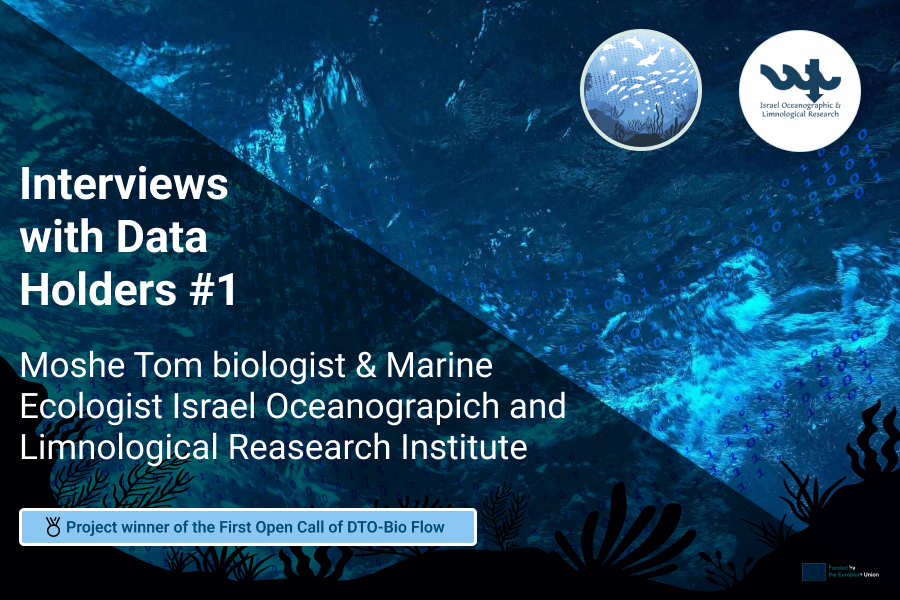This interview is part of a series featuring the nine winners selected during the first DTO-BioFlow Open Call.
This initiative aimed to identify data holders capable of facilitating sustained and long-term ingestion of previously inaccessible biodiversity data into the EDITO infrastructure, which supports the EU Digital Twins of the Ocean (DTO) programme through EMODnet. The selected projects cover a variety of topics and data collection methods, including citizen observation, AI-assisted imaging, net trawls and benthic grabs. These projects focus on diverse organisms, such as cetaceans, plankton and benthos,and cover different regions, from the Arctic Ocean to the Mediterranean Ocean to the Azores, ensuring a comprehensive approach to biodiversity data collection.
The interviews with the selected data providers were conducted during the Data Grants Holders Workshop in April 2024, held at the VLIZ (Flanders Marine Institute) InnovOcean Campus in Ostend, Belgium. This event was designed to equip participants with the necessary skills to reformat and implement quality control on their data, ensuring alignment with international standards and contributing effectively to EMODnet Biology. To explore the training, have a look at the training material, the post event article and the teaser.
In this interview, Tom Moshe, a marine biologist and ecologist at the Israel Oceanographic and Limnological Research Institute (IOLR), discusses the impact of their winning project, “Integration of Southeastern Mediterranean Long-Term Biodiversity Data into the EU-DTO.”
IOLR is already an active member of EMODnet, consistently contributing oceanographic and bathymetric data to its repositories. Their winning project focuses on integrating ISRAMARBIO biotic data with EMODnet Biology, and ultimately with DTO. This will establish a data flow from ISRAMARBIO, a publicly accessible IOLR database that consolidates biotic data collected over the past 130 years from the Mediterranean waters off Israel and select sites in the southeastern Mediterranean, into the EU system.
Who are you, and what is the name of your institute?
My name is Dr. Moshe Tom and I am a senior researcher in the Israel Oceanographic and Limnological Research (IOLR), a governmental research institute. The present project, the bio-geographic database of the Israeli waters of the Mediterranean, is managed in collaboration with Dr. Hadas Lubinevsky, head of the IOLR sedimentary ecology laboratory who participate in the data deposition, and Dr. Mor Canari, who belongs to the IOLR geology department and is responsible for the spatial presentation part (mapping) of the database. The person in charge of data deposition is Ms. Nerina Lenart, who joins me to this training workshop.
What type of data does your institute produce, how is it produced, and in which regions do you operate?
Our institute produces biological, oceanographic, chemical and physical data related to the marine and lake provinces of Israel, both from the aquatic bottom and the water body. The studied and monitored regions are: the Mediterranean Sea (Territorial and Essential Economic Zone regions, down to a depth of 2000 m), lake Kineret (sea of Galilee), the Dead Sea and the Gulf of Eilat, the Red Sea (territorial waters). IOLR operates a small fleet of vessels for data acquisition, including a 40 m deep sea-compatible vessel and a variety of smaller boats for inshore and lake activities. Two stationary data acquisition barges are located at lake Kineret and the Dead Sea, respectively. The utilized data acquisition devices for biota are: grabs and box corers, epibenthic sleds, trawls, plankton nets, remote operated vehicles (ROV) and manual collection, including scuba diving. In addition to the bio-geographic database, IOLR maintains a chemical-physical database, named ISRAMAR, and the Kineret database, both opened to the public.
How will your project add value to existing data flows?
Ecological data acquisition for analysis of natural phenomena and trends is a multi-annual task, performed in a broad spatial range, hence required “organisational memory”. The added values of our bio-geographic database are: the unified pattern of data deposition over time and geographic range, including raw data that could be re-analysed in view of novel information and the comprehensive metadata which accompanies each reported sampling event. The database includes not only data from scientific publications but from reports and dissertations, part of them not in international languages, therefore, not easily available to the scientific community. In summary, monitoring and scientific studies could use the available data to integrate their results into a broader temporal and spatial context of Israeli Mediterranean waters.
What is the expected impact of your proposed project?
Our bio-geographic database is part of an integrative system, based on the Geographic Information System (GIS), containing also division of the Israeli Mediterranean waters into habitats (similar to the European EUNIS) and a variety of GIS auxiliary layers of background information (e.g., map of nature reserves and marine protected areas, hill-shade map, maps of pockmarks and methane seeps-related features and a map of human interference). Its availability to environmental decision makers, non-governmental organizations and the scientific community makes it easier for them to reach a variety of environmental and scientific insights. The integration of the data with the European databases would improve and broaden its standardization and would increase its exposure, enabling the further broadening of the context.
How will this involvement or opportunity enhance your institute's capacity?
The present standardization and integration of our data with other sources would mutually enhance IOLR capacity, as well as the capacity of European partners, especially reaching deeper insight regarding East and West Mediterranean ecological and bio-geographical inter-relationships.
